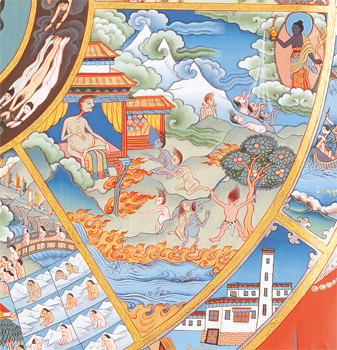Preta

Preta (Skt.; Tib. ཡི་དྭགས་, yi dak, Wyl. yi dwags) — one of the six classes of beings. Sometimes translated as 'hungry ghost'.
Etymology
The Sanskrit preta literally means 'departed'.
Descriptions
Chökyi Drakpa says:
- "The preta realm is destitute of food and drink, creating hunger and thirst. It is a grim place of rocks and charred tree stumps, where the words ‘food’, ‘drink’ or ‘comfort’ have never even been heard. [...] Since these pretas do not find anything to eat or drink for months and years on end, their bodies are emaciated like skeletons and they lack even the strength to stand. The principal cause [for being reborn there] is being miserly or greedy for wealth and possessions."[1]
Sogyal Rinpoche says in The Tibetan Book of Living and Dying:
- "[In a psychological sense, the hungry ghost realms] exist wherever people, though immensely rich, are never satisfied, craving to take over this company or that one, or endlessly playing out their greed in court cases."[2]
Subdivisions
Patrul Rinpoche speaks of two types of preta:
- those who live collectively
- those who move through space (Tib. མཁའ་ལ་རྒྱུ་བ་)
The former are further divided into three:
- those suffering from external obscurations (Tib. ཕྱིའི་སྒྲིབ་པ་ཅན་)
- those suffering from internal obscurations (Tib. ནང་གི་སྒྲིབ་པ་ཅན་)
- those suffering from specific obscurations (Tib. སྒོས་ཁུར་གྱི་སྒྲིབ་པ་ཅན་)
The pretas who move through space, he says, include spirits such as the tsen, gyalpo, shindré, jungpo, mamo, and teurang.[3]
References
- ↑ Chökyi Drakpa, A Torch for the Path to Omniscience.
- ↑ page 117.
- ↑ Source for this section: Patrul Rinpoche, The Words of My Perfect Teacher (Boston: Shambhala, Revised edition, 1998), pages 72-75.
Alternative Translations
- Anguished Spirits (Dorje & Coleman)
- Famished spirit
- Hungry ghost
Further Reading
- Patrul Rinpoche, The Words of My Perfect Teacher (Boston: Shambhala, Revised edition, 1998), pages 72-76.